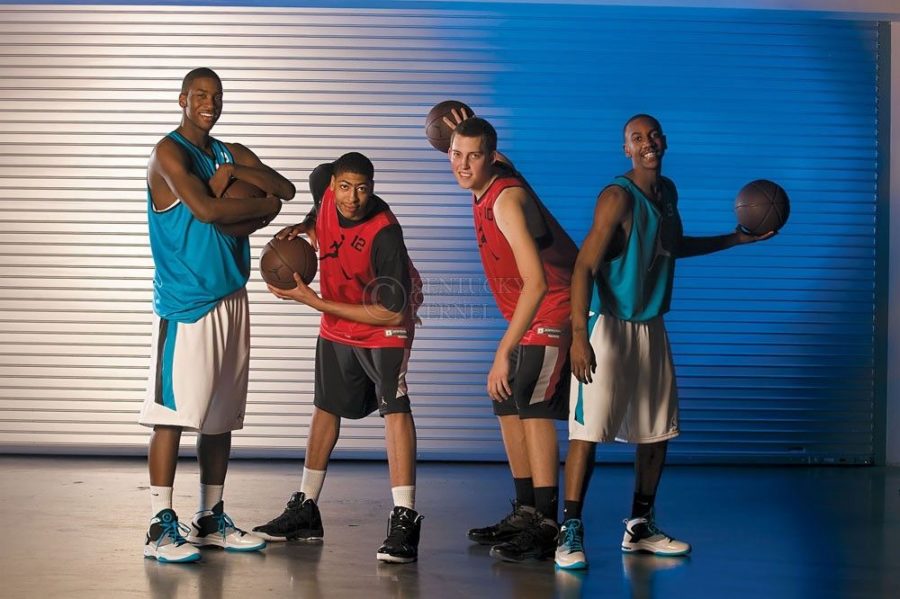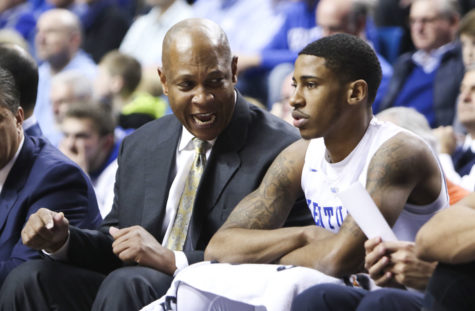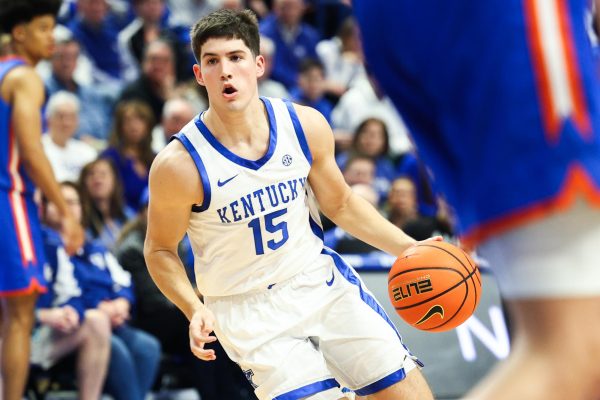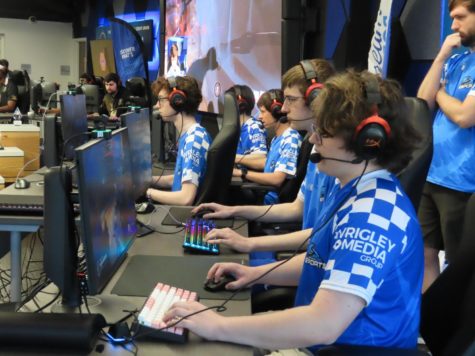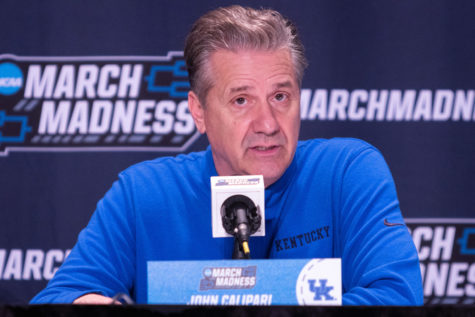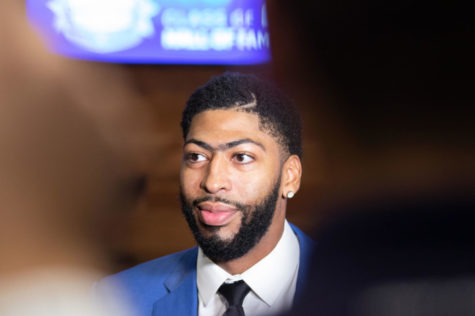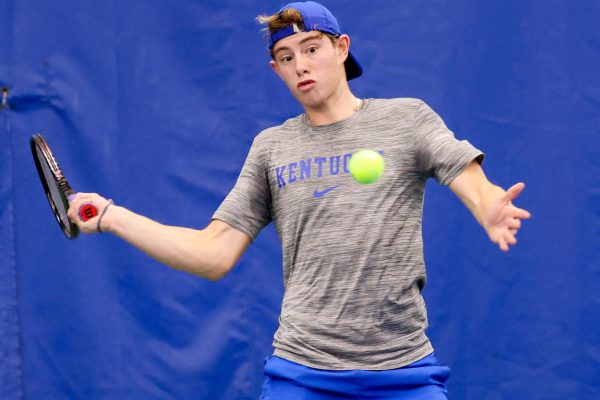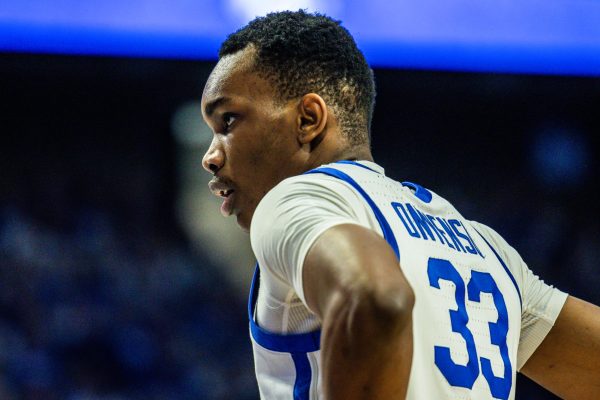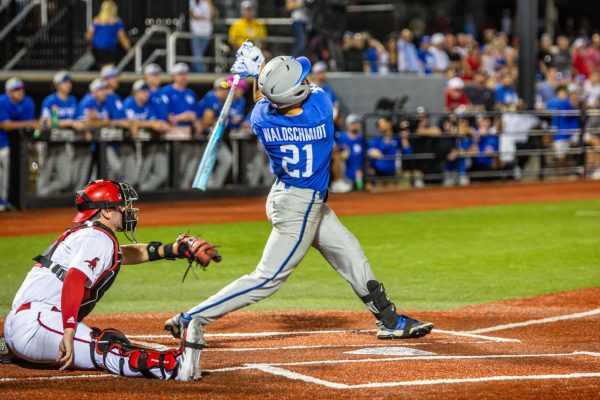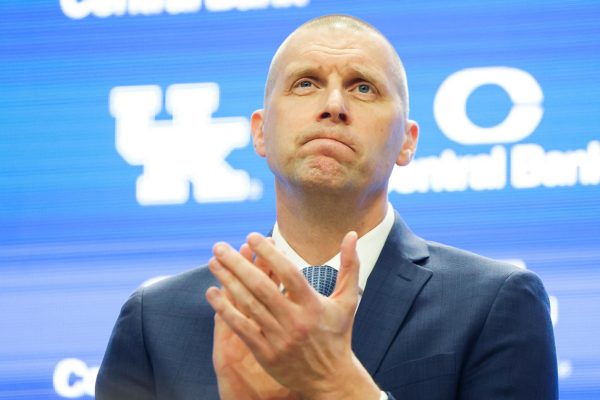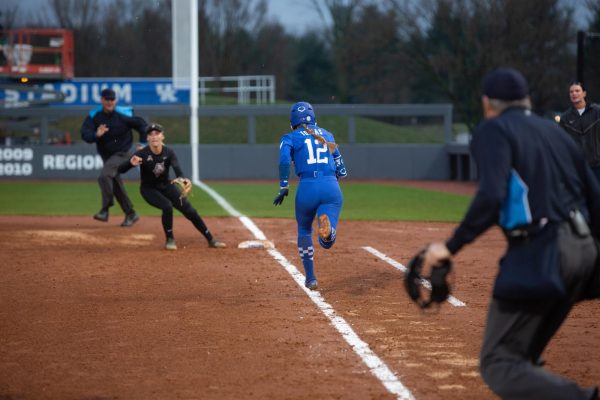Coming Soon: UK commits evoke limitless anticipation for next year
May 30, 2011
Three thousand, eight hundred and fifty people attended the gold-medal game between the USA and Poland in the 2010 FIBA U17 Tournament on July 11, 2010.
One of those people was John Calipari.
He went to Hamburg, Germany, for a whole week to watch the U.S. U17 Team march toward a gold medal. More importantly, he was watching two members of the USA team, Michael Gilchrist and Marquis Teague. They had already committed to UK in the spring. They were his two members of the USA team.
“The moment I really knew he truly cared about us was when he came out all the way to Germany to watch me and Mike play,” Teague said. “Just us. Nobody else was out there. No other people who he was recruiting.”
Calipari simply came, watched his future players, and left, back to America, back to UK, back to the team he had to get ready for the upcoming season.
Less than a year later, Gilchrist and Teague — along with Anthony Davis and Kyle Wiltjer — are now the next wave of talent crashing into Lexington. Two were added in the spring. Two were added in the summer. These are the four players expected to transcend the limitations of youth and win an eighth championship.
For a man who possesses so many tangible skills, it’s funny how Michael Gilchrist is most celebrated for his intangibles. The effort. The dedication. The possessive desire to win.
“People are going to love watching him play,” said Don Showalter, coach of the U17 gold-medal U.S. team, “because he plays so hard.”
He was named ESPN Mr. Basketball USA, and the primary contributing factor was for “never taking a possession off.” He won New Jersey’s Gatorade Player of the Year twice, including as a sophomore — when Kyrie Irving was his teammate.
Where he goes, others follow — including to UK. He was the first to commit, and he talked to the others about playing together, about creating something special to stand out even among the already special seasons occurring at UK.
“I think Gilchrist will be (that on-court leader),” Showalter said, who saw it for himself on the U.S. team. “He’ll take that role. He’s so competitive. And he wants his teammates to be as competitive as he is. But he has a nice way of bringing that across.”
There it is again, that competitiveness. Calipari said he loves how hard Gilchrist plays, how much effort he exerts for second- and third-chance opportunities, how he’s the guy who comes in early and stays up late — but also the guy who gets others to do the same.
“Michael’s just a competitor,” Calipari said. “And you put him on a team full of competitors, and he’ll just take his stuff up another notch. I’ve seen it.”
Gilchrist’s UK landmarks, however, are intertwined with personal tragedy.
His father was murdered when he was two years old. Gilchrist told ESPN he watched “The Lion King” every Friday after school, remembering his father.
Sometimes it would hurt. The story was too real, too him. But his memory can live on, must live on. Michael wore No. 31 in high school, his dad’s number. Every free throw he shot, he would close his eyes and think about his dad. Gilchrist announced his college choice on April 14, they day his dad would have turned 44.
Then signing day came. Gilchrist and his family gathered for a celebration of his dreams. “We’re going to try to make it a fun, family event and just look back on the blessings that have led Michael to this point,” Michael’s mother told 247sports the week before the event. But the day of the signing, Michael’s uncle collapsed. Michael performed CPR on him for 18 minutes, according to ESPN. It didn’t work. His uncle passed away, four hours before Michael was set to sign his Letter of Intent. In his uncle’s honor, Michael went ahead with the signing and celebration. He was creating a new UK family.
Marquis Teague shouldn’t be worried about being next in the succession of John Calipari point guards. He’s been following greatness his whole life.
His father, Shawn, played for Rick Pitino at Boston University. His cousin, David, was a Second Team All-Big Ten guard at Purdue. His older brother, Jeff, played at Wake Forest and has moved into the NBA with the Atlanta Hawks. Each Teague gradually eclipsed his immediate predecessor’s success; Marquis is expected to do the same. And while the two could be “taken as twins if you look at them,” said Showalter, “Marquis is better than his brother at this stage.”
Watching Jeff play with the Hawks now — Atlanta is currently playing Orlando in the NBA playoffs — is distantly familiar to Marquis. He sees Jeff make a move, and he knows how the defender feels. He’s been that defender before. The classic tale of backyard battles between brothers was borne out frequently. The classic ending of little brother losing was also borne out frequently — Marquis has yet to beat Jeff.
“But we haven’t had the chance to play in a while,” Marquis Teague said. “When we play now, it’s going to be a little different.”
But those familial one-on-ones are insignificant, just a sideshow. The losses there weren’t as painfully real as his high school losses; despite playing for a powerhouse Pike program, Teague was knocked for not advancing far enough his first three years.
Entering his senior year, Teague had to adjust to a new coach leading the way. Bill Zych, who coached Teague at Pike this past year, had coached against Teague at a rival school, and he had waited through the AAU summer before getting to meet Teague. Those first couple meetings, the pair talked about developing a trust and working with each other — a situation that Teague will again face once he officially becomes a player under Calipari. There was no butting heads, Teague said.
“I think he’s really misunderstood,” Zych said. “He’s a quiet, shy, unassuming kid off the floor. Really straight forward. He looks you in the eye and has conversations.”
The other perception, though, comes from Teague’s on-court demeanor. His first few years, he was a flurry of talent — and the accompanying emotion was overbearing. He celebrated after breakaway dunks. He talked incessant trash on the court. It was too much.
“I cut that out of my game completely,” Teague said. “But I still play with emotion. That gets me pumped up and ready to go. I pound my chest if I dunk on somebody.”
Celebrating dunks are celebrations of the individual, of a singular explosive play. Teague has plenty of those. But when Pike finally broke through to win the Marion County Tournament, winning four games in four days, Teague showed his emotions in unison with his teammates, dancing and laughing and celebrating with his teammates.
“It wasn’t a true Marquis moment, it was more of a team thing,” Zych said. “And that’s when he came to understand that we’re all in this together.”
For Teague’s Senior Day, Jeff was in town for a Pacers game and made it to the gym.
Given the chance to deliver his parting words, Marquis told his brother he looked up to him, that he’s been his role model, that he’s thankful for guiding him in both basketball and life.
“Talking to Jeff that night, he didn’t believe Marquis would say something like that,” Zych said. “Not because he didn’t feel it, but because he usually doesn’t express it. It kind of touched him.”
The words, Marquis Teague said, just seemed right.
“I felt like it was the night to do it.”
Anthony Davis makes a walk downstairs to eat at Perspective Charter School. He’s still in high school, remember, and high schoolers go to cafeterias to eat. Davis towers over everybody, and not just because he’s 6-feet-10 and the Best Recruit in America. He towers over seniors, and he towers over sixth graders; Perspectives houses them all in the same building.
“Every time he walks downstairs to go to lunch, he gets stopped by the little kids,” said his high school coach, Cortez Hale. “They all want his autograph.”
Being the epicenter of adulation has only recently become standard for Davis.
Through his sophomore year of high school, he was a 6-feet-3 guard. Good enough to play Division I basketball, sure, but not good enough to be thinking about playing for UK, because “everybody is 6-foot-3,” said Hale. “I knew he had to grow a couple inches to get into the Top 100.”
Instead, Davis grew 7 inches and became the No. 1 recruit in America.
“He came to a summer game, and I was like, ‘Anthony, what is this dude? Where did this come from?’” Hale said. “He said, ‘I just woke up one day and this is what it was.’ I said, ‘Awesome. Wake up again and grow some more.’”
Anthony maintained his guard skills, but now they were packaged inside a sinewy body that bounded all over the floor. He’s still developing a post game, improving his footwork and his hands and his physicality — but not his personality. He hadn’t been an elite recruit in his early high school years. The U17 squad, the same one that picked Gilchrist and Teague, passed him over for other perimeter players. Coaches weren’t transfixed on him. So when they did — including UK, which started recruiting Davis the summer before his senior year — he wasn’t changed by it.
“He’s the same kid,” Hale said. “Not too much changed except for his height and his shoe size. … He’s not used to being told, ‘you’re the best player.’ He’s always used it as motivation. And now he’s still using it as motivation.”
The changes that did occur landed him spots in the McDonald’s All-American Game, the Nike Hoops Summit and the Jordan Brand Classic. Heading into the final game of the three, Davis hadn’t won an MVP honor yet. He wanted one. So he dropped 29 points and 11 rebounds, got the co-MVP trophy and told his coach that his Twitter was blowing up.
Those games built camaraderie, even as the four UK recruits had to alternatively play with and play against each other. It was musical chairs, just with extremely talented high school basketball players.
“Coach kept making fun of Anthony, like ‘you’re letting your boys score,’” Hale said of the Jordan game. “Anthony was like, ‘I have to let them score.’ They were cracking jokes on each other all game.”
One hundred and thiry-six days after Gilchrist first committed to UK, Kyle Wiltjer announced he was coming too, completing a quartet that has remained unchanged since. His first stated reason for the decision was that he wanted to surround himself with the best players; by choosing UK, he ensured that.
While he was the featured player for the Canadian National Team, he won’t be a primary option in UK’s offense.
“He’s not the type who needs the ball in his hands or have the offense run through him,” said Team Canada head coach Roy Rana.
His game has a distinct international flavor to it (as does his life — he’s a dual citizen). His father, who played at Oregon State and was on the Canadian Olympic team in the 1980s, would teach him drills when Wiltjer was in the developmental stages of his basketball life. The education led to a running jump hook that Calipari said he is waiting to run plays for. He has an outside shot that won him the McDonald’s All-American three-point contest. His game isn’t founded on the sheer, unattainable athleticism of the other three; instead, it’s predicated on intelligence and guile.
Showalter coaches the U.S. team, but has great respect for how the international system and game helps develops an all-around game. The concept of positionality — that a player is bound to a certain position because of height — is nonexistent. Players work on every facet of their game. That versatility is evident in Wiltjer.
“Wiltjer’s not quite the athlete the other three are,” said Showalter. “But he can really shoot it and has a great feel for the game.”
Still, Wiltjer recedes into the background of consciousness easier than the others, for a multitude of factors. He plays high school basketball across the country and plays competitive basketball for another country. He’s a consensus top-20 recruit, but that puts him more than double the distance back from the third-ranked player in UK’s class. He was the last of the four to commit to UK, and by the time he did, UK fans had already rejoiced over the new haul.
When he played for the World Team in the Nike Hoops Summit, he stood on the other side of the floor from Davis, Teague and Gilchrist, all three donning the USA jerseys. Wiltjer was playing with some of his best friends for the Canada team. He was also playing against some of his best friends for his future team.
“He was so professional,” said Rana. “Playing against three guys you know you will end up playing with — it’s not easy. He balanced it very well.”
***
The four have played together before, in some form. Gilchrist and Teague played together for the U.S. team. All four were on the same court for each of the three All-Star games. But they’ve never quite been united in one jersey. Not yet.
That day will come soon. They went to the 2010 Big Blue Madness together — when he got back, Davis told his coach UK “was the place to be” — and text each other all the time. Teague called their bond “like a brotherhood.”
The four get to campus in June. They start practicing in August. They start playing in November. But the most important month, of course, is March, and they’re already thinking about that. Davis has already said UK can and will win the championship.
“He’s seen what they all can do,” Hale said. “So he’s like, ‘Why not? Why not say we’re going to win the national championship?’”

















































































































































